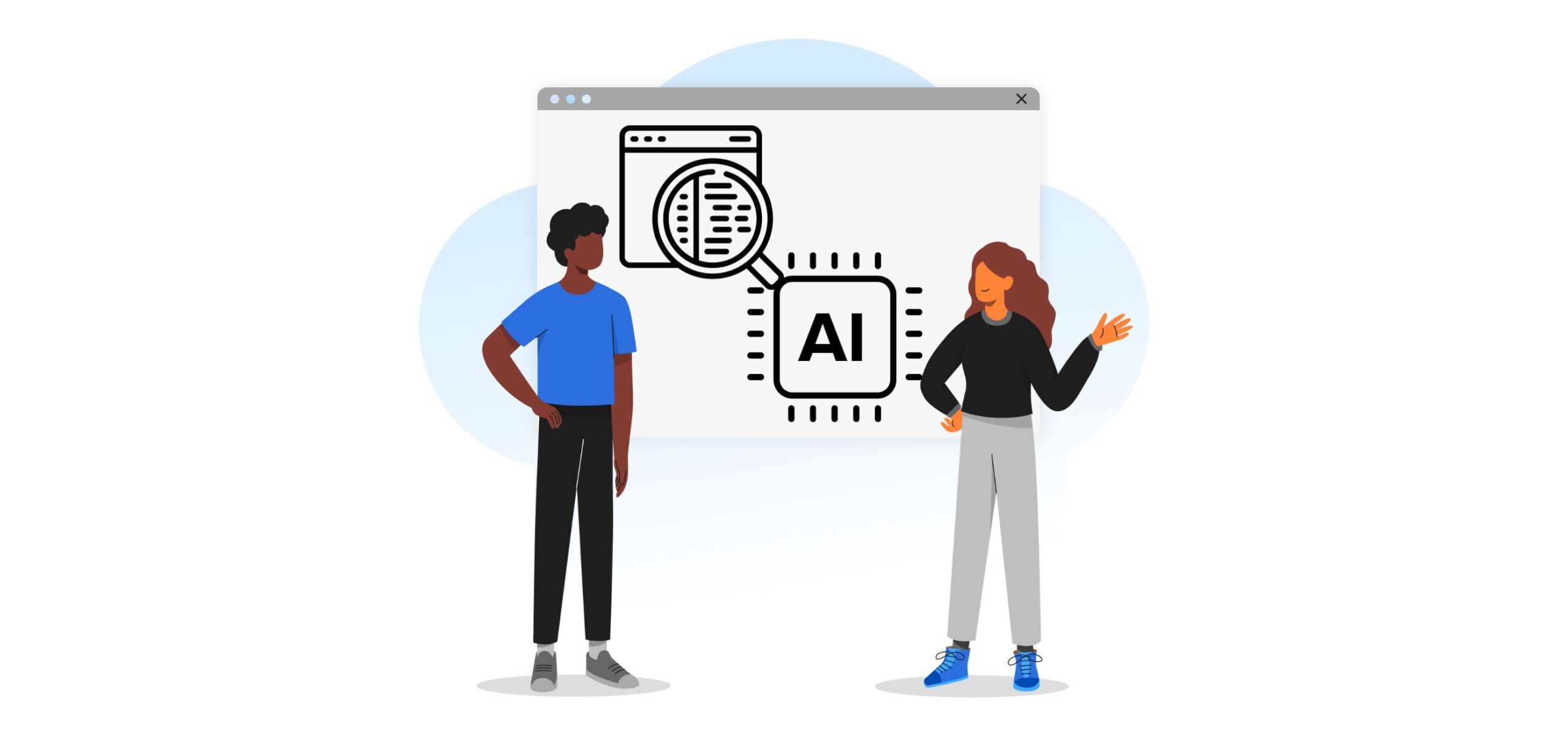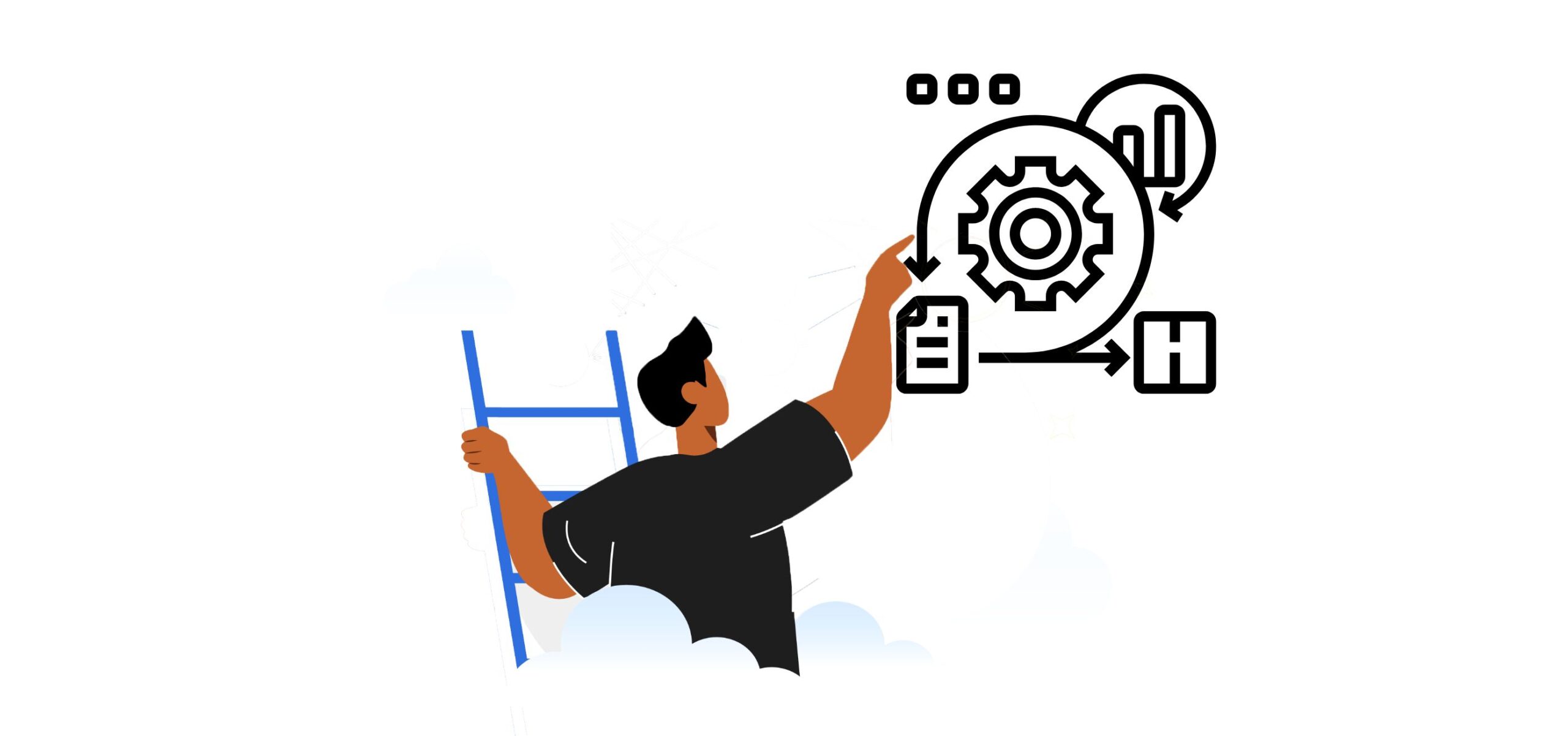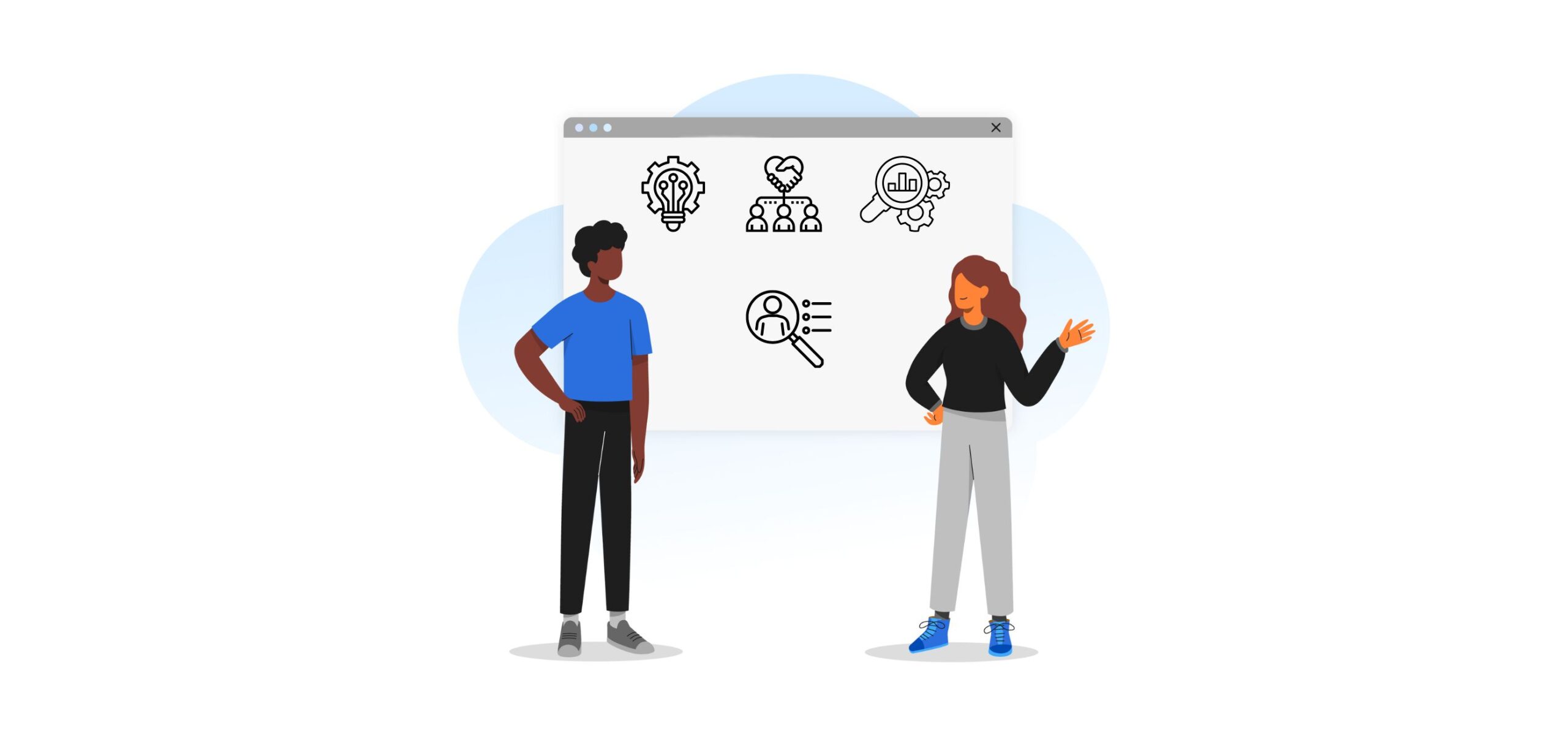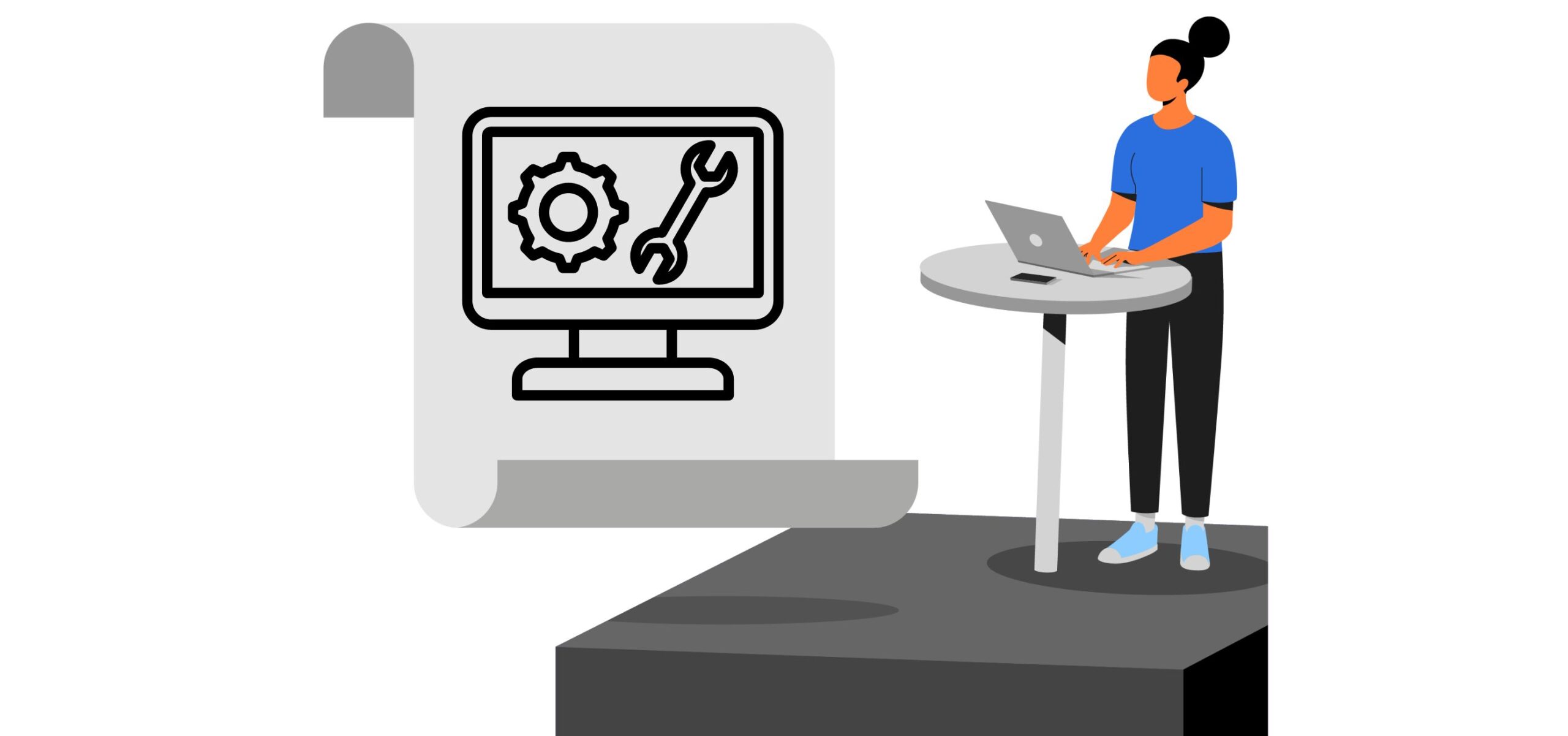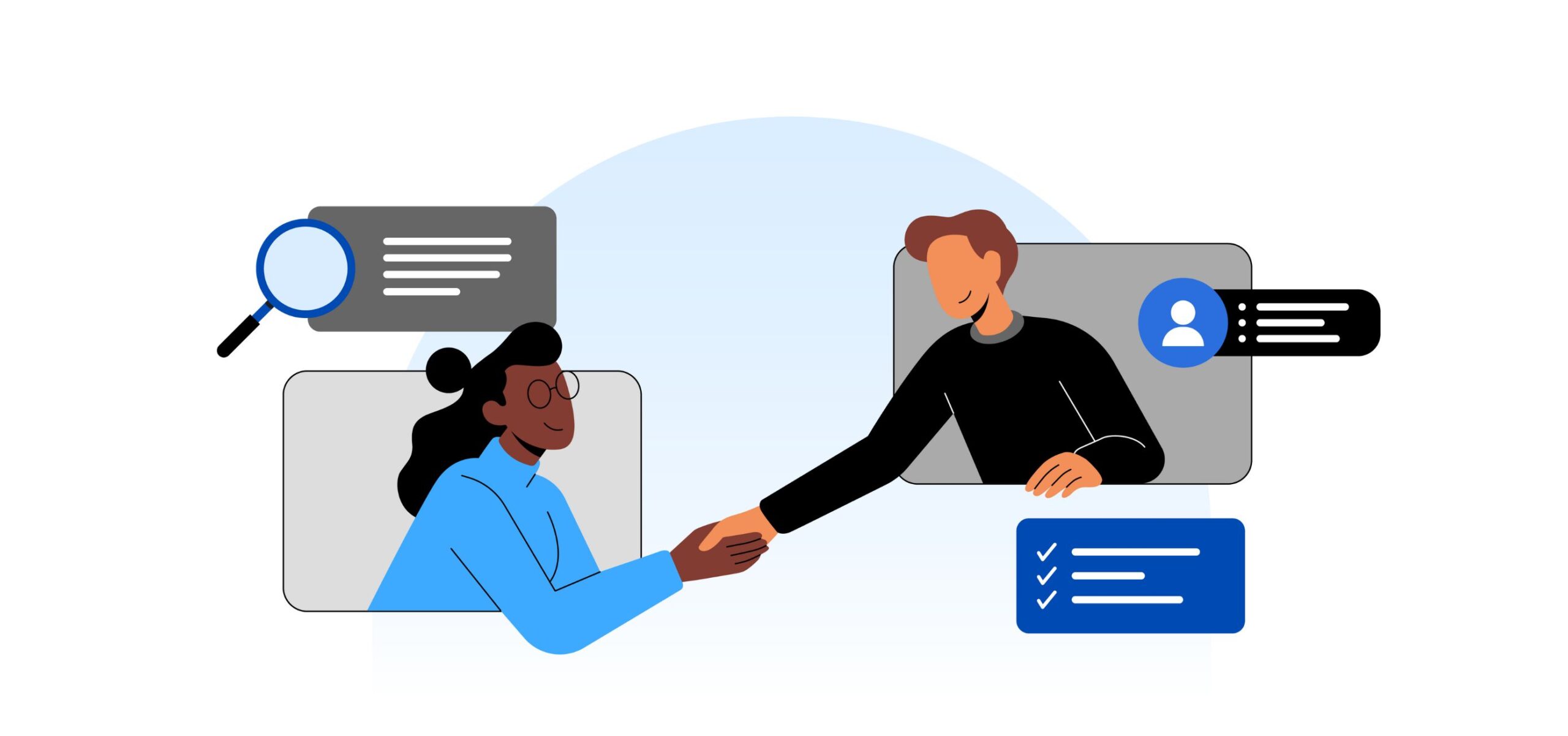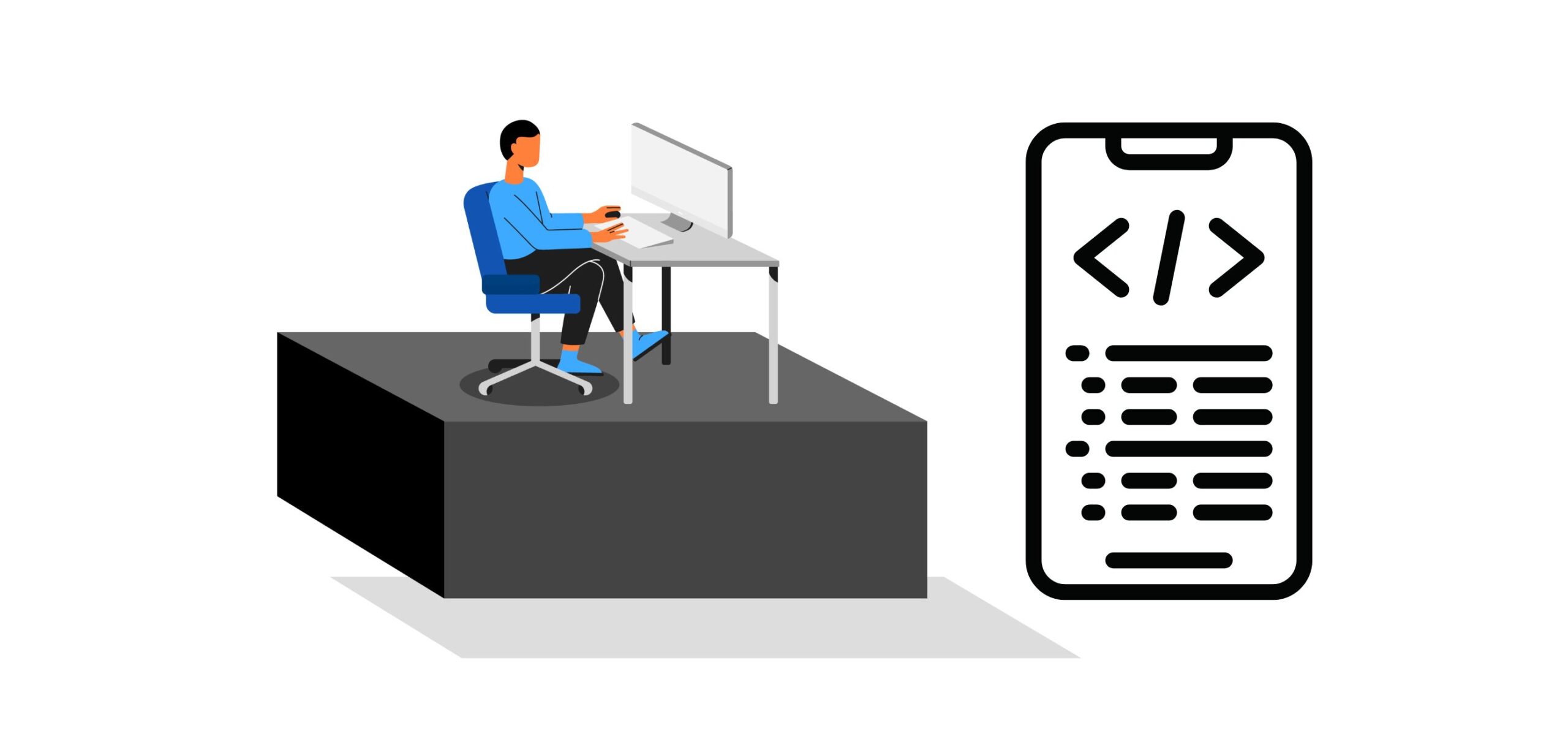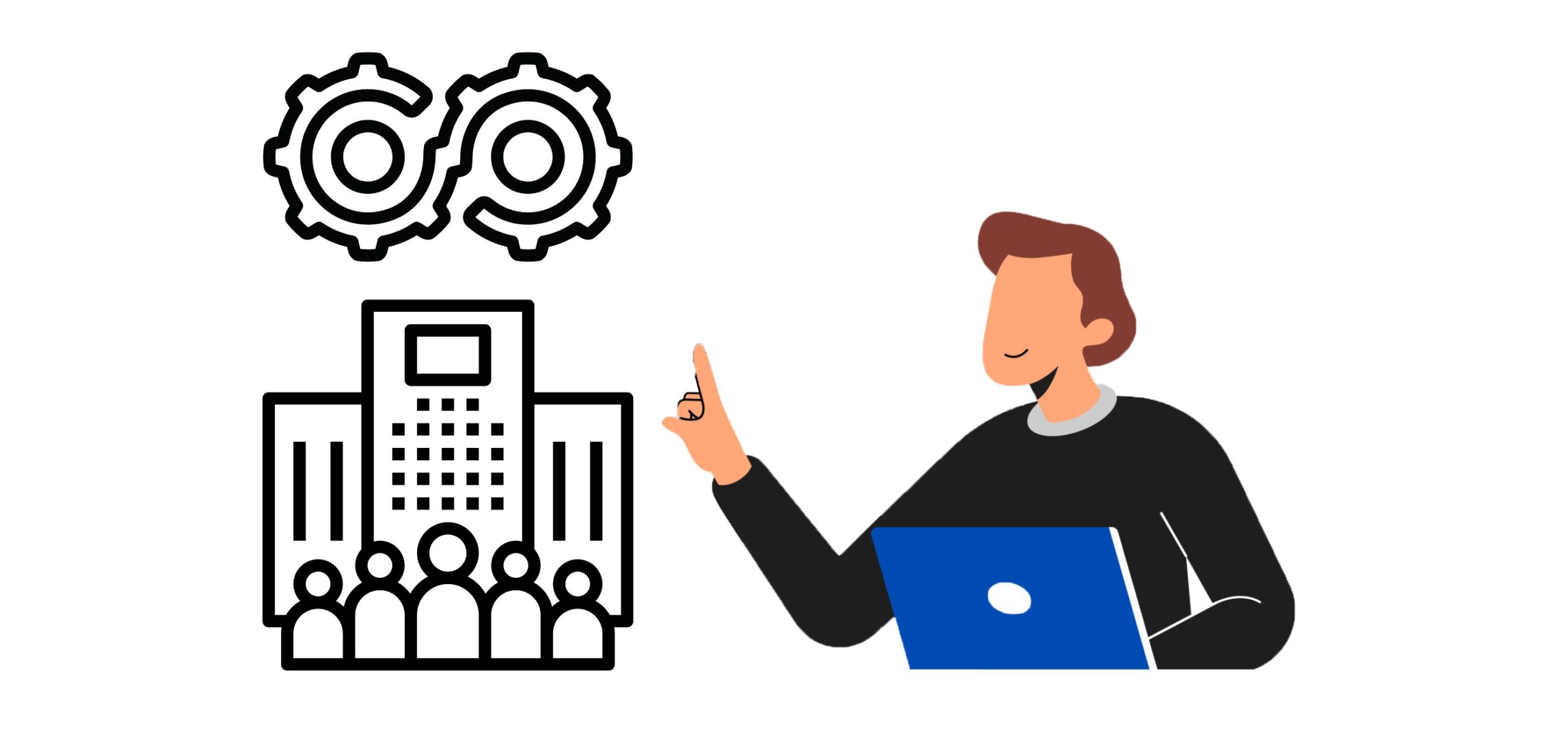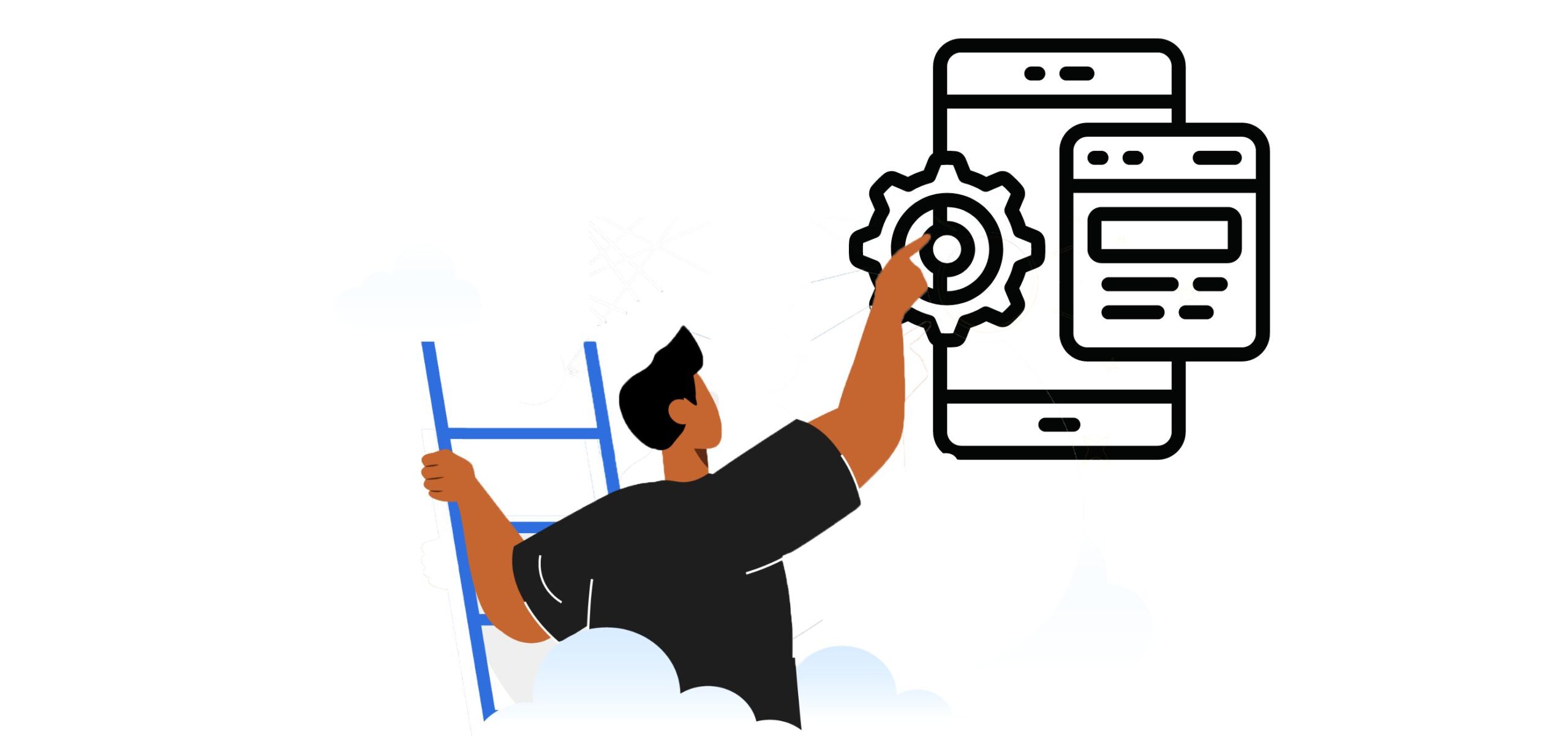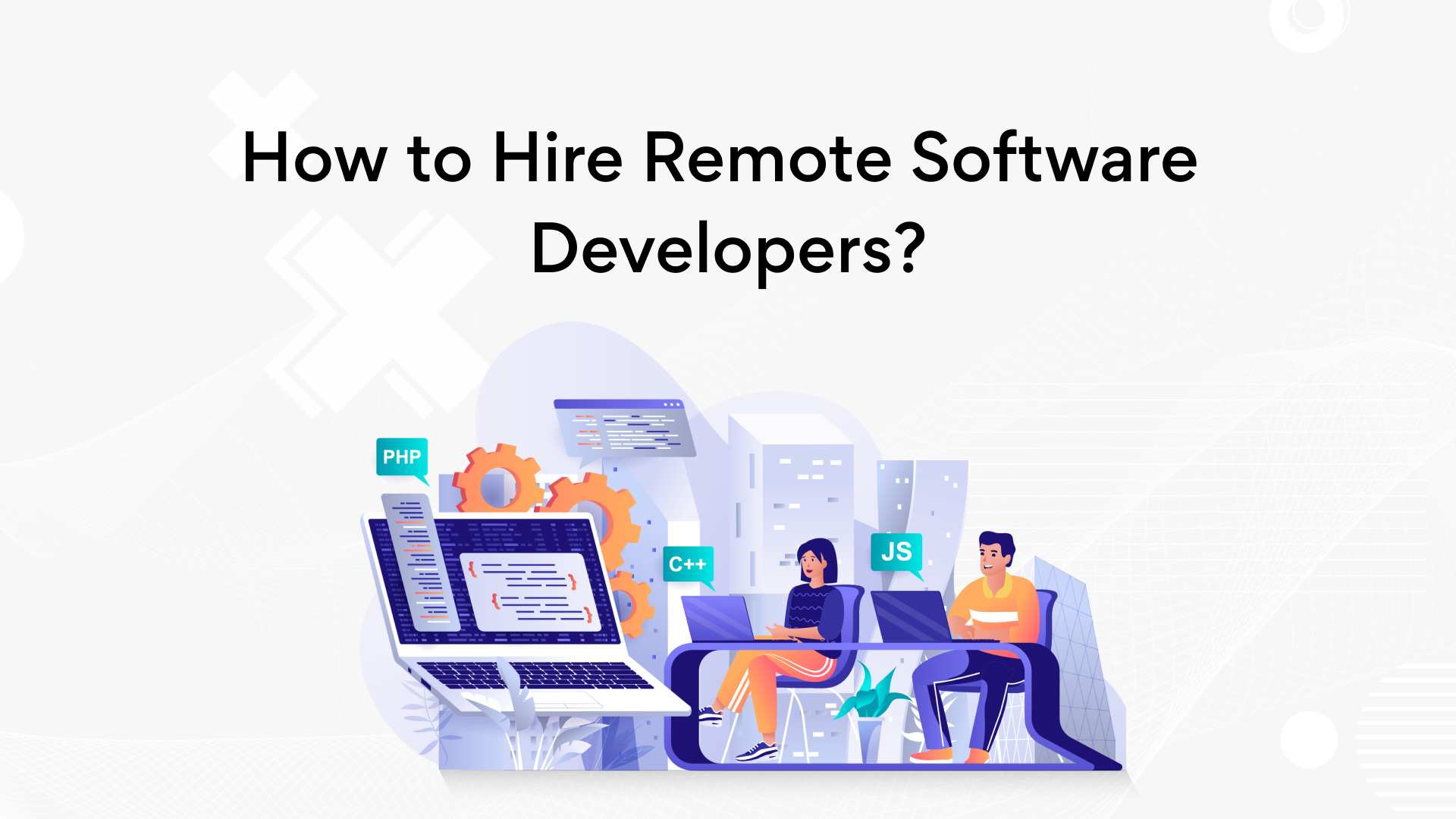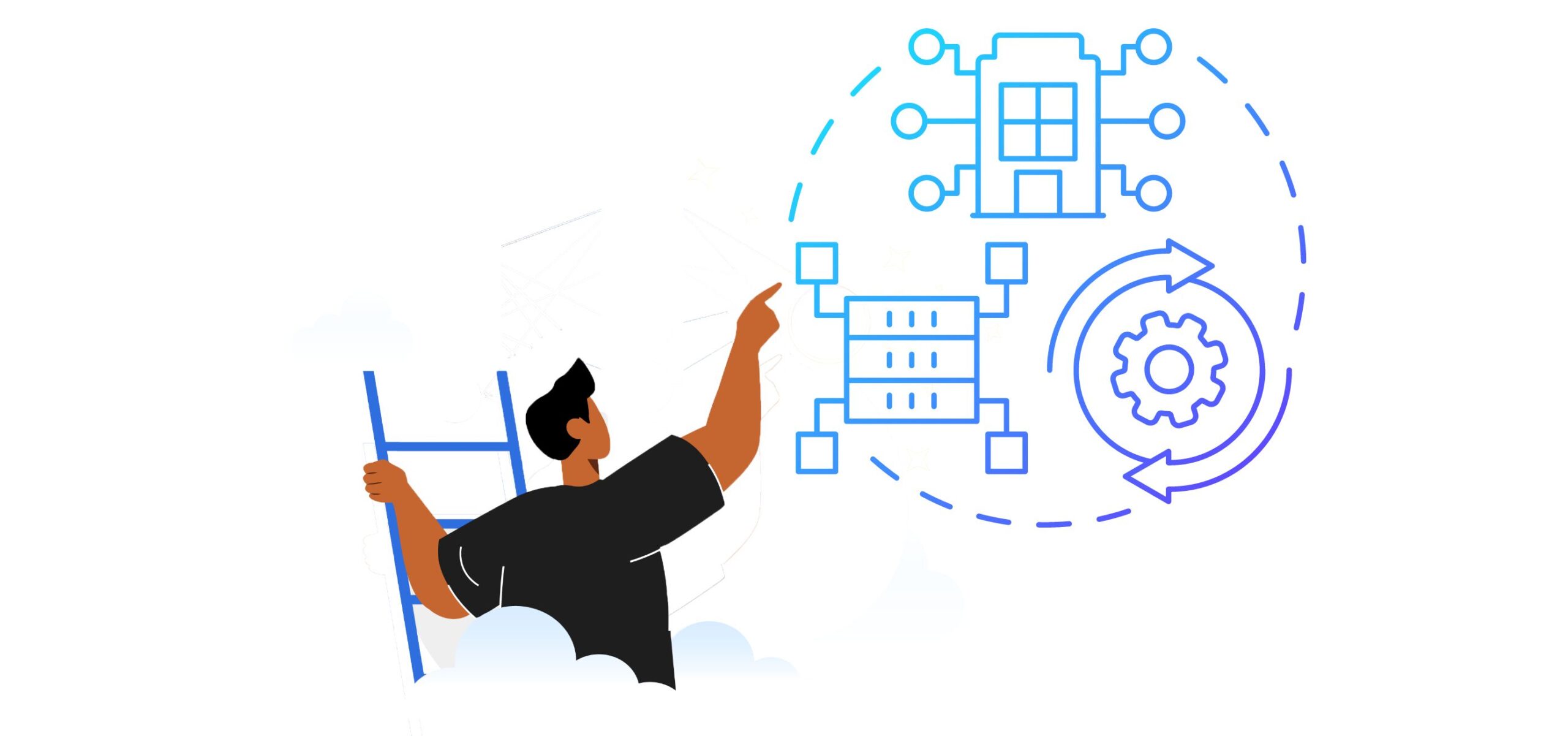AI-Enhanced Code Reviews: Improving Software Quality and Efficiency
Code reviews have long been a critical practice in software development. They serve as a quality control mechanism, ensuring that code is not only functional but also maintainable, secure, and efficient. However, traditional manual code reviews come with their own set of challenges, such as time consumption and the potential for human error. This is where AI code reviews come in.
In recent years, the rise of artificial intelligence (AI) has ushered in a new era of code reviews, with AI-driven tools and processes offering the promise of improved software quality and efficiency. In this blog, we’ll explore the significance of code reviews, the emergence of AI in this domain, and how AI-enhanced code reviews can revolutionize software development.
Why are code reviews important?
Code reviews are really necessary for keeping software quality. They involve developers examining code to identify and rectify issues before they can impact the final product. Here’s why they matter:
- Quality Assurance: Code reviews act as a software quality assurance checkpoint, catching bugs and defects before they reach production. This ensures a more reliable and stable software application.
- Knowledge Sharing: They promote knowledge sharing among team members, allowing developers to learn from each other’s coding styles and best practices.
- Maintainability: Code that passes through thorough reviews tends to be more maintainable, reducing technical debt and making future updates and enhancements easier.
- Security: Code reviews help in identifying security vulnerabilities, a critical concern in today’s interconnected world.
- Consistency: They enforce coding standards and maintain code consistency across a project, enhancing readability and collaboration.
Traditional code reviews, while effective, can be time-consuming and resource-intensive.
This is why, AI code reviews
AI is playing an increasingly prominent role in code reviews, delivering several critical advantages:
- Speed and Scalability: AI-powered code review tools possess the remarkable ability to analyze code at an unprecedented pace. This rapid processing significantly shortens review times, facilitating quicker software development cycles and expediting time-to-market. In a landscape where software delivery speed is paramount, AI’s speed and scalability offer a distinct competitive edge.
- Consistency: Unlike human reviewers who can experience fatigue and distractions, AI remains tirelessly consistent. It maintains unwavering attention to detail, regardless of the code’s complexity or duration of review. This unwavering consistency is especially beneficial for globally distributed development teams, ensuring continuous, high-quality reviews around the clock.
- Pattern Recognition: AI excels in recognizing intricate patterns and uncovering anomalies within code that human reviewers might overlook. This pattern recognition capability is invaluable for detecting subtle issues and identifying potential vulnerabilities. With each review, AI refines its pattern recognition skills, further enhancing the accuracy and depth of code analysis.
- Data-Driven Insights: AI-equipped code review tools provide data-driven insights into code quality. They monitor code metrics, such as complexity and adherence to coding standards, across the entire codebase. These insights empower teams to identify trends, prioritize areas for improvement, and make informed decisions. Additionally, AI offers actionable recommendations based on historical data and best practices, guiding developers to write high-quality code from the outset.
- Reduced Bias: AI code reviewers operate without human biases, ensuring a more objective assessment of code quality. This impartiality can lead to fairer evaluations and less friction among development teams.
- Language Agnostic: AI can analyze code written in various programming languages, making it a versatile solution suitable for diverse development environments.
AI’s integration into code reviews represents a fundamental transformation in how software development teams operate. It not only automates and expedites the review process but also brings a level of consistency, pattern recognition, and data-driven decision-making that significantly enhances code quality and development efficiency.
How do AI code reviewers work?
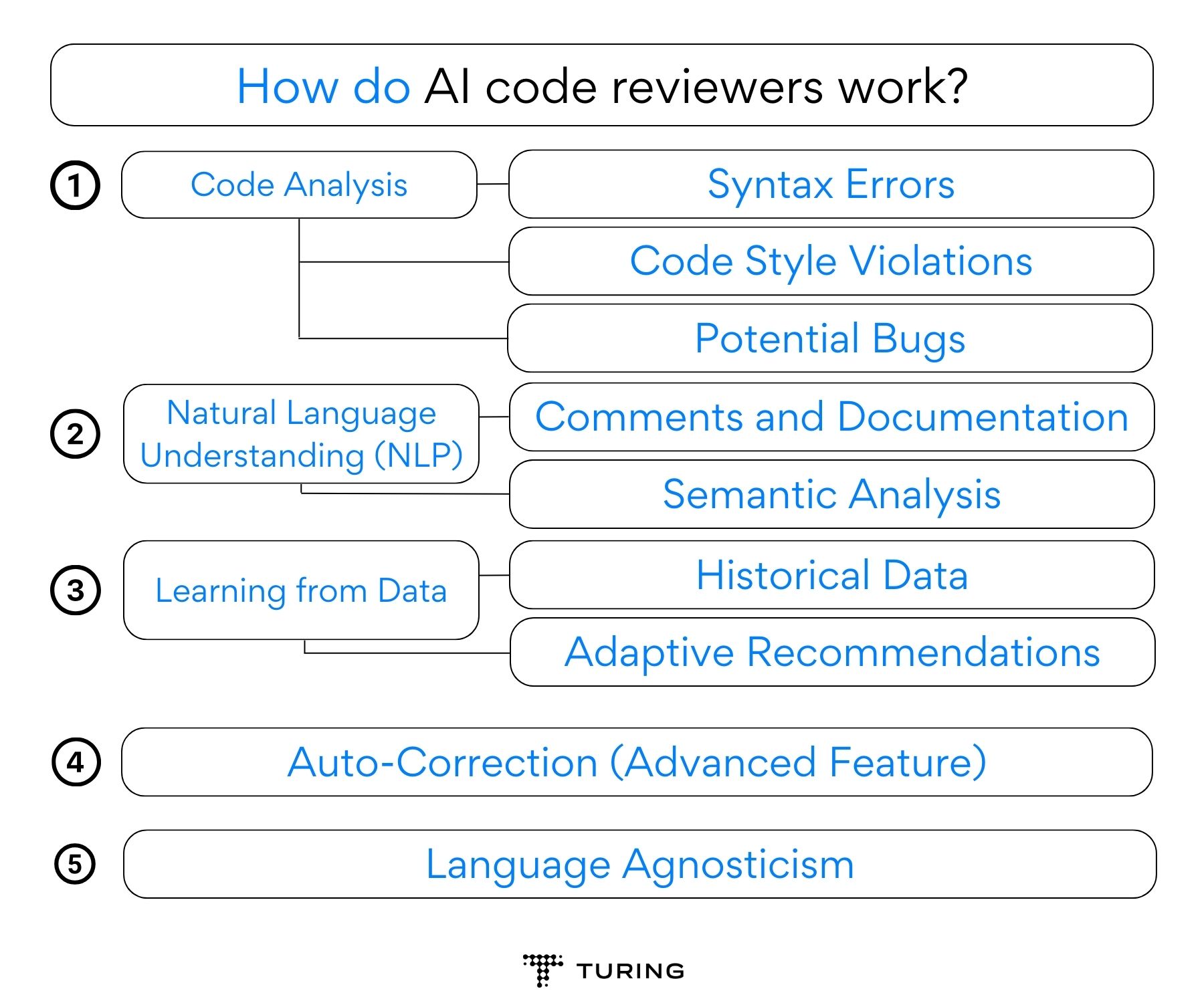
How do AI code reviewers work?
Understanding the inner workings of AI code reviewers reveals the power and precision of these tools. They employ a combination of advanced techniques, primarily centered around machine learning and natural language processing (NLP):
-
Code Analysis
AI code reviewers begin by scanning the source code thoroughly. This process involves identifying and flagging various aspects, including:- Syntax Errors: AI checks for violations of the programming language’s syntax rules, ensuring that the code is structurally sound.
- Code Style Violations: They analyze the code against coding standards and guidelines, highlighting deviations in coding style.
- Potential Bugs: AI utilizes its knowledge of common coding errors and bug patterns to identify potential issues. This proactive approach helps catch bugs early in the development process.
-
Natural Language Understanding (NLP)
In addition to code analysis, AI code reviewers incorporate NLP techniques to comprehend the context and intent behind code changes:- Comments and Documentation: NLP enables AI to understand comments, documentation, and commit messages associated with code changes. This contextual awareness helps AI reviewers make more informed assessments of code quality.
- Semantic Analysis: NLP can perform semantic analysis of code comments, extracting meaningful information and identifying connections between code and comments. This aids in identifying discrepancies or misalignments.
-
Learning from Data
AI code reviewers continuously learn and evolve from historical code reviews and codebases. This learning process is fundamental to their ability to identify issues and provide recommendations:- Historical Data: AI draws insights from past code reviews, code repositories, and the collective knowledge of developers. This historical context helps AI reviewers become more effective over time.
- Adaptive Recommendations: AI adapts its recommendations based on historical data. If certain types of issues have been addressed in specific ways in the past, AI can provide tailored guidance to developers.
-
Auto-Correction (Advanced Feature)
Some advanced AI code reviewers have the capability to go beyond flagging issues; they can suggest or automatically implement code fixes. This feature streamlines the development process, as developers can choose to accept or modify AI-generated fixes, significantly reducing manual intervention. -
Language Agnosticism
AI code reviewers are designed to work across multiple programming languages, making them versatile and adaptable to diverse development environments.
AI code reviewers blend the power of code analysis, natural language understanding, and continuous learning to provide comprehensive, context-aware assessments of code quality. Their ability to identify errors, enforce coding standards, and even suggest fixes contributes to improved software quality and development efficiency.
Benefits of AI code reviews
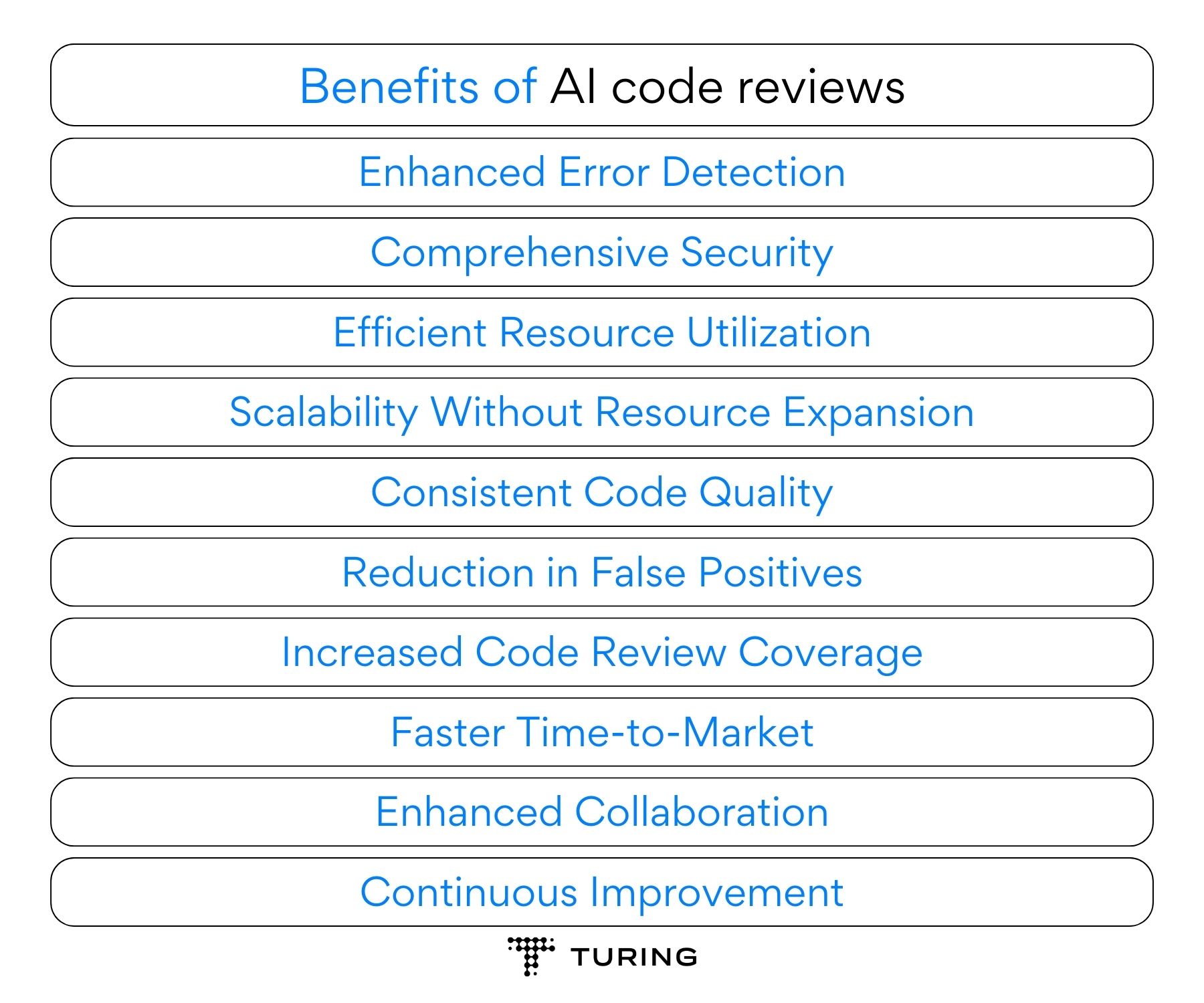
Benefits of AI code reviews
AI code reviews come with a plethora of benefits that have a profound impact on software development:
- Enhanced Error Detection: AI is highly proficient at identifying common coding errors, such as null pointer exceptions, memory leaks, and boundary condition problems. Its ability to catch these errors early reduces the likelihood of defects reaching production, resulting in more reliable software.
- Comprehensive Security: AI code reviewers excel at detecting security vulnerabilities, including potential entry points for cyberattacks. They can recommend patches and coding practices that bolster the software’s resilience against security threats, helping protect sensitive data and user privacy.
- Efficient Resource Utilization: By automating routine code reviews, AI frees up valuable developer time. Developers can redirect their efforts toward more complex, creative, and strategic tasks, such as architectural design and innovation.
- Scalability Without Resource Expansion: AI-powered code reviews are highly scalable. As project sizes grow, teams can handle the increased workload without the need for proportional expansions of human resources. This scalability is particularly advantageous for organizations with fluctuating development demands.
- Consistent Code Quality: AI maintains a consistent standard of code quality throughout a project. It enforces coding standards, best practices, and company-specific guidelines consistently, promoting uniformity in coding style and practices across the entire development team.
- Reduction in False Positives: AI code reviewers, when properly tuned, can significantly reduce the occurrence of false positives compared to manual reviews. This means developers spend less time investigating and addressing issues that aren’t actual problems, boosting productivity.
- Increased Code Review Coverage: AI can efficiently analyze and review a higher percentage of the codebase, including areas that might be overlooked in manual reviews. This extended coverage reduces the risk of undiscovered issues surfacing later in development.
- Faster Time-to-Market: The speed at which AI conducts code reviews accelerates software development cycles, leading to quicker time-to-market for software products. This agility is a competitive advantage in rapidly evolving industries.
- Enhanced Collaboration: AI code reviewers provide objective assessments, reducing subjective biases that can sometimes emerge in human code reviews. This fosters a more collaborative and constructive atmosphere within development teams.
- Continuous Improvement: AI-driven code review tools learn and adapt from each review. They gain insights from historical data and developers’ actions, improving their ability to identify issues and provide recommendations over time. This continuous learning benefits code quality and development efficiency.
AI code reviews offer a multitude of benefits that span error reduction, security enhancement, resource efficiency, scalability, consistency, and more. These advantages collectively contribute to the improved quality of code, shorter development cycles, and ultimately, a more competitive and agile software development process.
What are the challenges with AI code reviews?
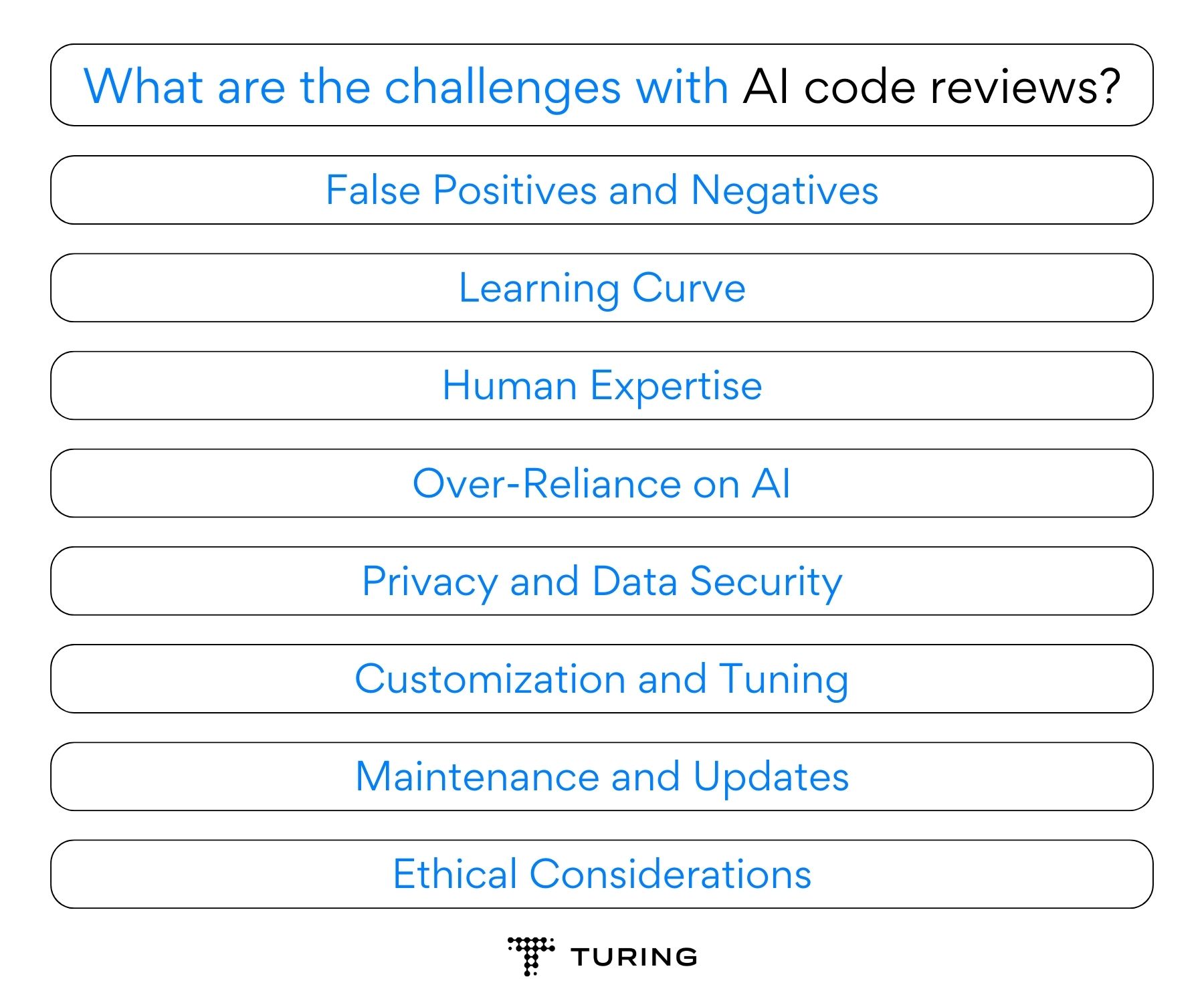
What are the challenges with AI code reviews?
While AI brings significant advantages to code reviews, it is not without its challenges and considerations:
- False Positives and Negatives: AI code reviewers may occasionally generate false positives by flagging issues that are not actual problems, or false negatives by missing real issues. This necessitates human intervention to validate and fine-tune AI recommendations. Striking the right balance between minimizing false alerts and capturing genuine issues is an ongoing challenge.
- Learning Curve: Implementing AI code reviews introduces a learning curve for development teams. They must adapt to new tools, processes, and workflows. This transition can require time and effort, potentially affecting productivity in the short term. Providing comprehensive training and support can help mitigate this challenge.
- Human Expertise: While AI is a valuable tool for automating code reviews, human expertise remains essential for making nuanced decisions. Developers bring domain-specific knowledge and contextual understanding that AI may lack. Project-specific requirements and business logic often demand human judgment for optimal decision-making.
- Over-Reliance on AI: Over-reliance on AI can be a concern. Teams may become complacent in performing manual code reviews, assuming that AI will catch all issues. This can lead to the neglect of critical aspects, particularly subtle or context-specific problems that require human judgment. Striking a balance between automated and manual reviews is crucial to maintain code quality.
- Privacy and Data Security: AI code reviewers analyze code, which may contain sensitive information or intellectual property. Ensuring the privacy and security of code repositories and review data is paramount. Implementing robust data protection measures and compliance with data regulations are essential considerations.
- Customization and Tuning: AI code reviewers often require customization and tuning to align with specific project requirements and coding standards. Teams must invest time in configuring AI tools to deliver optimal results. Regular adjustments may be necessary to adapt to evolving coding practices.
- Maintenance and Updates: AI models and tools require ongoing maintenance and updates to remain effective. Staying current with the latest AI advancements and ensuring that AI code reviewers evolve alongside changing coding practices is crucial.
- Ethical Considerations: AI code reviewers should be designed and used ethically. Developers and organizations must consider biases in training data and ensure that AI reviews adhere to ethical coding standards.
While AI significantly enhances code reviews, addressing challenges such as false alerts, learning curves, and over-reliance is crucial for its effective implementation. Organizations should approach the adoption of AI in code reviews thoughtfully, considering the specific needs and dynamics of their development teams and projects. Striking a balance between AI automation and human expertise is key to optimizing code quality and development efficiency.
Real-life use cases of AI code reviews
AI-driven code reviews have gained prominence in various industries and are being utilized by leading tech companies to enhance code quality and development efficiency:
-
GitHub’s CodeQL
GitHub, one of the world’s largest code hosting platforms, leverages CodeQL, an AI-powered static analysis tool. CodeQL’s sophisticated AI algorithms automatically identify security vulnerabilities in code. It doesn’t stop at detection; it also suggests fixes and patches. This AI-driven approach helps protect millions of open-source projects hosted on GitHub by proactively addressing security concerns. By finding and fixing vulnerabilities early in the development process, CodeQL contributes significantly to the overall security of the software ecosystem. -
Facebook Infer
Facebook employs Infer, an AI-based code analysis tool, to enhance software reliability and prevent issues from reaching the production codebase. Infer uses static analysis to identify a wide range of programming errors and potential crashes, even in complex and large-scale codebases. By catching bugs and issues before they propagate, Infer helps Facebook maintain the high quality and stability of its applications while reducing costly post-release bug fixes. -
Google’s DeepCode
DeepCode, developed by Google, is an AI-driven code review tool that goes beyond error detection. It provides intelligent suggestions for code improvements, offering specific recommendations to developers. By analyzing code patterns, coding styles, and best practices, DeepCode assists developers in writing cleaner, more efficient code. This not only reduces the likelihood of errors but also accelerates development by automating code enhancements. DeepCode is particularly valuable for optimizing development workflows and reducing coding errors, ultimately saving time and resources. -
Uber’s Aibolit
Uber has developed its AI-based code analysis tool called Aibolit. Aibolit is designed to identify code smells, which are indications of potential issues in code quality. It helps Uber’s developers maintain codebases that are clean and efficient. Aibolit assists in ensuring code adherence to the company’s coding standards and best practices, ultimately contributing to a smoother development process and improved code maintainability. -
Microsoft’s IntelliCode
IntelliCode, developed by Microsoft, enhances the code review process by providing AI-generated code completion suggestions and recommendations. By analyzing coding patterns and contextual information, IntelliCode assists developers in writing code faster and with fewer errors. This AI-powered tool integrates seamlessly with popular development environments, such as Visual Studio, improving productivity and reducing coding inconsistencies.
Conclusion
In the world of software development, where code quality directly impacts the success of a project, AI code reviews offer a powerful solution. They combine speed, consistency, and error detection capabilities that surpass human capabilities. While challenges remain, the benefits of integrating AI into your development workflow are undeniable. Embracing AI code reviews can significantly improve software quality and efficiency, ensuring that your projects meet the highest standards.
FAQs
-
-
What is the AI code reviewer in GitHub?
GitHub’s AI code reviewer, known as CodeQL, is a powerful tool that automatically scans code for security vulnerabilities. It not only identifies issues but also suggests fixes, helping developers enhance the security of open-source projects hosted on GitHub. -
Can AI be used for code review?
Yes, AI can be employed for code reviews. AI-driven code review tools analyze code for errors, style violations, and security vulnerabilities, significantly improving code quality and development efficiency. -
Will AI code review process replace developers?
No, AI code review processes will not replace developers. While AI enhances code reviews and automates certain tasks, human expertise, creativity, and decision-making remain essential in software development. AI is a valuable tool that complements developer skills but does not replace them. -
What is AI code reviewer?
An AI code reviewer is a software tool that uses artificial intelligence and machine learning techniques to analyze and review source code. It scans for errors, style violations, security vulnerabilities, and more, providing recommendations to improve code quality and efficiency. AI code reviewers are used to enhance the code review process in software development. -
Can we use AI for code?
Yes, AI is widely used in coding. It aids developers by generating code snippets, providing real-time code completion suggestions, and analyzing code for errors and vulnerabilities. AI-driven testing tools automate test case generation and execution, enhancing code quality and efficiency. While AI supports coding tasks, it complements, rather than replaces, human developers who bring creativity and problem-solving skills to software development. -
Is code review automation possible?
Yes, code review automation is possible and increasingly common. AI-powered tools can automate the code review process by analyzing code for errors, style violations, and security vulnerabilities. They provide detailed feedback and recommendations, significantly speeding up the review process and improving code quality. However, human oversight and expertise remain valuable for addressing nuanced issues and making context-specific decisions.
-
Tell us the skills you need and we'll find the best developer for you in days, not weeks.
